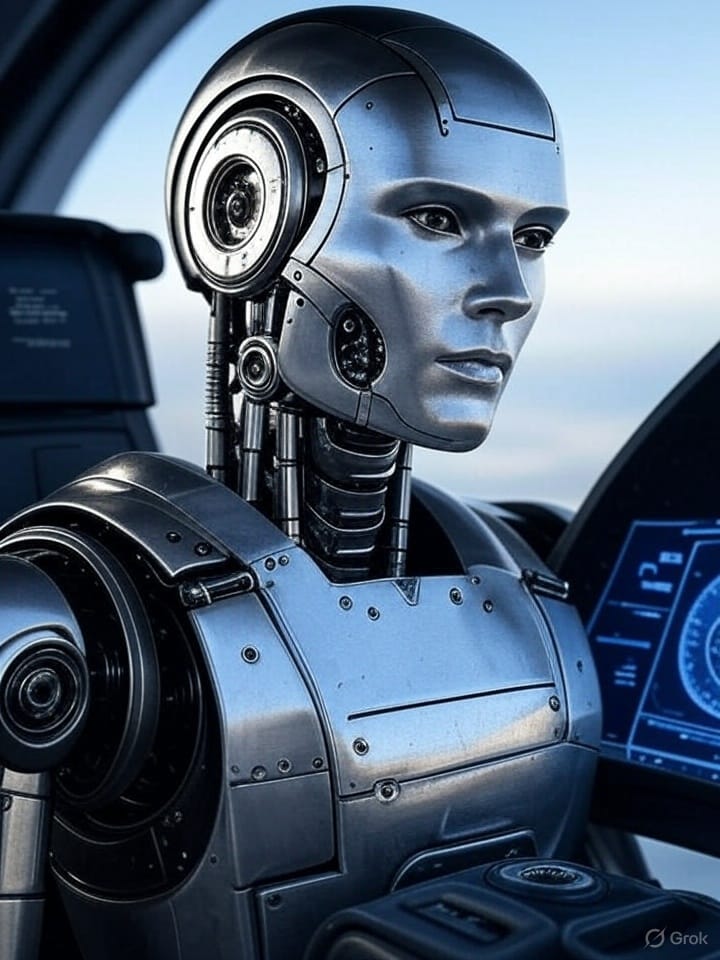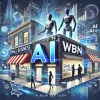
WBN " The Work Recode Series " explores the changing relationship between people, jobs, machines, and AI
By Elke Porter | The Work Recode Series Column | June 3, 2025
Subscription to WBN and being a Contributor is FREE!
As aviation giants accelerate their shift towards artificial intelligence and robotics, an industry synonymous with human expertise is witnessing unprecedented technological transformation.
From Boeing's autonomous cargo operations to Airbus's AI-powered maintenance systems, the transition to AI-driven aviation is reshaping employment across commercial airlines, cargo operations, and military aviation. Major carriers like United Airlines are deploying AI copilots, while companies like FedEx experiment with fully autonomous cargo drones for last-mile delivery.
This transformation impacts hundreds of thousands of aviation professionals worldwide, from pilots and air traffic controllers to maintenance crews and cargo handlers. Industry experts predict that while complete human replacement remains years away due to safety regulations and public acceptance, significant workforce evolution is inevitable as machines increasingly handle routine operations.
Industry Transformations: Job Replacements & New Opportunities
Major Changes Announced:
Commercial Aviation:
- United Airlines implementing AI copilot systems, reducing crew requirements on long-haul flights by 2027
- Delta testing autonomous ground handling equipment, affecting baggage and cargo loading positions
- Southwest exploring AI-powered flight planning, potentially reducing dispatcher roles by 30%
Cargo Aviation:
- FedEx deploying autonomous delivery drones for rural routes, impacting traditional pilot positions
- UPS implementing AI-powered sorting facilities, reducing manual package handling by 60%
- DHL testing fully robotic cargo loading systems at major hubs
Military Aviation:
- U.S. Air Force expanding unmanned combat aerial vehicle (UCAV) programs
- NATO countries investing in "loyal wingman" AI fighter jets
- Autonomous aerial refueling systems reducing human tanker crew requirements
Roles Being Rewired:
- AI-Enhanced Pilots now collaborate with advanced autopilot systems and predictive flight management
- Digital Maintenance Specialists use AI diagnostics and predictive analytics for aircraft servicing
- Autonomous Systems Coordinators oversee unmanned aircraft operations from ground control centers
- Smart Logistics Analysts manage AI-optimized cargo routing and delivery systems
- Hybrid Air Traffic Controllers work alongside AI systems for enhanced flight path optimization
Watch for Emerging Jobs (less than 18 months old):
- Aviation AI Safety Auditor – ensuring ethical decision-making in autonomous flight systems
- Human-Machine Aviation Interface Designer – creating intuitive cockpit experiences for AI-assisted aircraft
- Drone Fleet Operations Manager – coordinating large-scale autonomous cargo and delivery operations
- Predictive Aircraft Maintenance AI Specialist – using machine learning to prevent mechanical failures
- Aviation Cybersecurity Specialist – protecting AI-driven aircraft systems from digital threats
The Great Aviation Divide: Winners & Losers
Winners:
- Software engineers developing flight management AI at Boeing and Airbus
- Robotics specialists creating autonomous ground support equipment
- AI researchers optimizing fuel efficiency and flight routing algorithms
- Cybersecurity experts protecting increasingly connected aircraft systems
- Drone operation specialists managing emerging autonomous fleets
Losers:
- Traditional cargo handlers facing automation, with an estimated 150,000 job losses by 2035
- Conventional air traffic controllers as AI systems handle routine flight coordination
- Manual aircraft inspectors being replaced by AI visual recognition systems
- Some commercial pilot positions, particularly on shorter, routine routes
Sector Deep Dives: Strategies & Initiatives
Commercial Aviation: The Gradual Transition
Boeing & Airbus: Leading the AI Revolution
- Showcasing autonomous flight systems at major air shows, with full commercial deployment targeted for 2030
- AI-powered predictive maintenance reducing aircraft downtime by 35%
- Emphasizing hiring of aerospace AI engineers and human-factors specialists
Major Airlines: Cautious Innovation
- United Airlines and Lufthansa piloting AI copilot programs on select routes
- Emirates investing in AI-powered customer service and operations optimization
- Regulatory approval remains the primary bottleneck for widespread adoption
Cargo Aviation: Rapid Automation
Express Delivery Giants: Racing Toward Autonomy
- FedEx and UPS competing for first fully autonomous cargo network by 2028
- Amazon Prime Air expanding drone delivery capabilities across urban areas
- DHL implementing AI-powered hub operations reducing human labor by 50%
Military Aviation: Strategic Advancement
Defense Contractors: Accelerated Development
- Lockheed Martin and Northrop Grumman developing next-generation UCAVs
- Boeing's "loyal wingman" program creating AI fighter jet companions
- Reduced human pilot risk driving rapid military adoption
Timeline: When Will Humans Be Replaced?
Short Term (2025-2027):
- Ground Operations: 40% of cargo handling and baggage processing automated
- Maintenance: AI diagnostics handling 60% of routine aircraft inspections
- Military: Expanded UCAV operations for reconnaissance and combat support
Medium Term (2028-2032):
- Cargo Aviation: 70% of cargo flights between major hubs become fully autonomous
- Commercial Aviation: AI copilots standard on all long-haul flights
- Air Traffic Control: AI systems managing 50% of routine flight coordination
Long Term (2033-2040):
- Commercial Aviation: Short-haul flights (under 2 hours) potentially single-pilot or autonomous
- Cargo Aviation: Nearly complete automation for standard cargo routes
- Military Aviation: Majority of combat missions conducted by autonomous systems
Complete human replacement in commercial passenger aviation remains unlikely before 2040 due to:
- Regulatory requirements for human oversight
- Public acceptance and trust issues
- Complex emergency scenarios requiring human judgment
- International aviation safety standards
Ripple Effects: Small Business & Workforce Skills
- Regional airports face pressure to adopt AI systems or risk losing airline partnerships
- Flight training schools pivoting to AI-assisted pilot education programs
- Aircraft maintenance providers investing in AI diagnostic tools or facing obsolescence
- New opportunities for AI consulting firms specializing in aviation applications
In-demand skills include:
- Python and C++ programming for aviation AI systems
- Computer vision for autonomous flight navigation
- IoT connectivity for smart aircraft systems
- Aerospace cybersecurity defending aircraft networks
- Human-machine interface design for next-generation cockpits
- Regulatory compliance for AI aviation systems
Policy & Future Outlook
- FAA and EASA developing comprehensive AI aviation regulations by 2026
- International Civil Aviation Organization (ICAO) establishing global autonomous flight standards
- $5 billion global aviation workforce transition fund proposed by industry coalition
- Pilot unions negotiating AI transition protections and retraining programs
Hydrogen and Electric as Wild Cards:
- Electric aircraft development creating new maintenance and operations roles
- Hydrogen-powered aviation potentially requiring specialized technical expertise
- Sustainable aviation fuels (SAF) optimization using AI creating hybrid job categories
The Bottom Line: While aviation's transformation toward AI and robotics is accelerating, complete human replacement remains a gradual process extending over the next 15-20 years. Safety regulations, public trust, and the complexity of aviation operations ensure that humans will maintain critical oversight roles even as machines handle increasing operational responsibilities.
The industry's challenge isn't whether humans will be replaced, but how quickly workers can adapt to collaborative human-AI aviation systems that define the future of flight.
TAGS: #Recode Series #AI at Work #Aviation AI #Pilot Jobs #Future Of Flight #Autonomous Aircraft #Cargo Drones #Military Aviation #WBN News Global #WBN AI #Elke Porter
Connect with Elke at Westcoast German Media or on LinkedIn: Elke Porter or contact her on WhatsApp: +1 604 828 8788
#Recode Series #Aviation AI #Future Of Flight #Pilot Jobs #Autonomous Aircraft #Aviation Tech #Workplace Transformation #WBN News Global #WBN Ai #Elke Porter
Connect with Elke at Westcoast German Media or on LinkedIn: Elke Porter or contact her on WhatsApp: +1 604 828 8788



